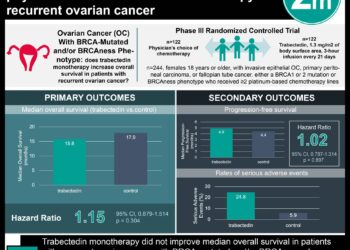The SOLO1 trial: Olaparib significantly delays progression of advanced ovarian cancer
1. In women with BRCA-associated, newly diagnosed advanced ovarian cancer, olaparib significantly prolonged progression-free survival (PFS) at three years compared to placebo.
2. The majority of adverse events reported in the olaparib group were low-grade. Among high-grade adverse events, anemia and neutropenia were the most common.
Evidence Rating Level: 1 (Excellent)
Study Rundown: Though many women with advanced (stage III or IV) ovarian cancer achieve clinical remission with first-line surgical cytoreduction and platinum-based chemotherapy, the majority will relapse within three years. The poly(adenosine diphosphate-ribose) polymerase (PARP) inhibitor olaparib has been approved as maintenance therapy in BRCA-associated cancers after failure with several chemotherapy agents; however, its use earlier in treatment is under investigation. This study reports results from the SOLO1 trial, which assessed the PARP inhibitor olaparib as maintenance therapy in women with newly diagnosed, BRCA-associated, advanced ovarian cancer. At three years, there was a significantly prolonged PFS – the primary outcome – for women treated with olaparib compared to placebo. Among secondary endpoints, olaparib significantly prolonged the rate of second PFS and time to first subsequent therapy or death. The results suggest that olaparib may become a standard of care following platinum-based chemotherapy in this patient population.
This was the first phase III trial to evaluate a PARP inhibitor as maintenance therapy in BRCA-associated, newly diagnosed advanced ovarian cancer, and the results demonstrate a clear benefit with olaparib in this population. However, since most patients had a germline BRCA mutation and a complete response to initial chemotherapy, more data is needed before the results can be generalized to the entire ovarian cancer population. In addition, longer-term analysis is required to determine the impact on overall survival and provide more toxicity data.
Click to read the study in NEJM
Relevant Reading: Oral poly(ADP-ribose) polymerase inhibitor olaparib in patients with BRCA1 or BRCA2 mutations and recurrent ovarian cancer: a proof-of-concept trial
In-Depth [randomized controlled trial]: Patients (n=391) with stage III or IV epithelial ovarian cancer (serous or epithelioid ovarian cancer, primary peritoneal cancer, and/or fallopian-tube cancer) were randomized in a 2:1 ratio to olaparib (n=260) or placebo (n=131, one of which withdrew). All patients had a confirmed germline (99% of patients) or somatic BRCA1/2 mutation, had underwent cytoreductive surgery, received platinum-based chemotherapy without bevacizumab, and demonstrated complete (82%) or partial (18%) clinical response. The primary endpoint was estimated PFS at three years. Secondary endpoints included second PFS, overall survival (OS), time to first subsequent therapy or death, and health-related quality of life. Adverse events were reported and graded with the National Cancer Institute Common Terminology Criteria.
The primary endpoint was calculated after 198 of the 391 patients had disease progression or had died (data maturity, 51%) and a median duration of follow-up of 40.7 months in the olaparib group and 41.2 months in the placebo group. The estimated rate of investigator-assessed progression-free survival at three years was 60% with olaparib and 27% with placebo (hazard ratio [HR], 0.30; 95% confidence interval [CI], 0.23 to 0.41; P<0.001). The estimated second PFS rate at three years was 75% with olaparib vs. 60% with placebo (HR, 0.50; 95% CI, 0.35 to 0.72; P<0.001). The interim analysis of three-year OS was 84% with olaparib and 80% with placebo (HR, 0.95%; 95% CI, 0.60 to 1.53). The median time to first subsequent therapy or death was 51.8 months with olaparib vs. 15.1 months with placebo (HR, 0.30; 95% CI, 0.22 to 0.40). Most reported adverse events were grade 1 or 2. In the olaparib group 21% of patients experienced serious adverse events vs. 12% of patients with placebo (the most common being anemia). Three women (1%) developed acute myeloid leukemia that required olaparib discontinuation. No clinically significant difference in health-related quality of life was reported.
Image: PD
©2018 2 Minute Medicine, Inc. All rights reserved. No works may be reproduced without expressed written consent from 2 Minute Medicine, Inc. Inquire about licensing here. No article should be construed as medical advice and is not intended as such by the authors or by 2 Minute Medicine, Inc.







